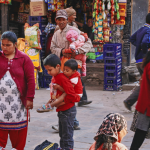Governments around the world have embraced ‘legal empowerment’ as an end in itself and as an essential element in the fight against poverty. Legal empowerment seeks to improve a person’s ability to understand and use the law. The United Nations Commission on Legal Empowerment estimates that 4 billion people live outside the protection of the law.[1] For these people, the law is an abstraction or a threat, but not something they can use to exercise their basic rights.
People all around the world suffer from a lack of access to justice, either from an inability to afford a lawyer and/or ignorance of authorities. Often poor and disenfranchised, these individuals and sometimes whole communities struggle to find means of redress and recourse for harm done to them. The provision of the rule of law and justice contributes to the building of equitable, inclusive, and economically prosperous societies. However, mere legal protection of the rights of the people in developing societies remains insufficient to ensure due protection guaranteed by the law.[2] They have to rely on informal or traditional institutions, which often leaves them vulnerable to exploitation and discrimination. This article briefly examines the value of an affordable justice delivery model for community-based paralegals to safeguard access to justice for marginalised populations.
Why Paralegals Are Essential in Nepalese Society
A paralegal is a layperson possessing the relevant skills and training to provide legal advice and assistance to the people they are serving in a community. They have legal literacy skills, knowledge of substantive laws and skills in how to negotiate the court system. According to the Kampala Declaration on Community Paralegals (2012), community paralegals “use knowledge of law and government and tools like mediation, organising, education, and advocacy to help people seek concrete solutions to instances of injustice.” Community paralegals can be instrumental in the realisation of economic, social, and cultural rights and human rights.
The United Nations Principles and Guidelines on Access to Legal Aid in Criminal Justice Systems, adopted by the United Nations General Assembly in December 2012, is the first international instrument to deal with legal aid wherein paralegals are also recognised. Paralegals provide a crucial link to justice services and legal redress in Nepal, particularly for the rural poor. Although the 2015 Constitution of Nepal has guaranteed rights and benefits of legal aid to all Nepali citizens, including the right to legal assistance, accessing these benefits remains a challenge. Community-based paralegals fill this gap by providing dispute resolution and legal support that is both geographically and financially accessible and informed by a deep understanding of the social issues and everyday challenges faced by their clients.
Community-based paralegals, despite not being able to provide the full range of legal services like lawyers or pro bono lawyers, draw on their unique understanding of community needs and dynamics and utilise legal empowerment strategies to uphold community interests and advocate for reform of government policies, legislation, and public institutions. They commonly receive specialised training in providing legal aid at the community level and work directly with people affected by injustice through a grassroots approach primarily based on legal empowerment. Their approach can be more friendly than the formal justice system and help the locals with their concerns. For example, a research project in Tanzania and Mozambique found that women were more likely to pursue legal claims after legal education on land rights, but this alone was not sufficient to achieve change in agency. Women in villages where paralegals were connected to lawyers were most effective in bringing their cases to court and in translating the claim into a remedy.[3]
The Present Status of Paralegal Work in Nepal
Community-based paralegal programs have been initiated by a range of actors, including community development groups, human rights organisations, and legal clinics at law schools. Employed or sponsored by NGOs, paralegals have so far worked primarily on the edge of the legal system, performing a very important function. In Nepal, there are two types of paralegal programs in existence: Government paralegals and community paralegal training run by United Nations Children’s Fund (UNICEF). A total of 195 programmes for paralegal training were conducted between 1992 and 2012; it led to the onboarding of 7,000 volunteers.
Paralegals have been working to provide vital registrations to vulnerable and marginalised people (mostly women and children), ensuring that government programmes reach them. Usually, they engage in these projects voluntarily.
Community paralegals also worked during the COVID-19 pandemic, providing the community with important information like the precautions necessary to avoid the spread of the disease. As community paralegals also work as social workers in local communities, they took the initiative to provide necessities like masks and sanitisers to locals who could not afford these on a daily basis.
Even though their work of providing basic legal assistance to the people was affected during the pandemic, the paralegals tried their best to continue their efforts. More than 300 law students, paralegals, and student paralegals volunteered to provide remote research, drafting, and other support to attorneys working on pro bono coronavirus-related matters.[4]
A recent research[5] on community-based paralegals conducted by the Dalit Women Rights Forum (DWRF), determined that these paralegals support people from marginalised communities by conducting awareness programs, giving health advice to those affected by HIV, assisting in vital registration processes, basic legal services, referral services, counselling, mediation, social security allowances, finding accommodation for helpless women, children and elderly in the community, and more. The research also includes a few success stories from the Kailali district of Nepal, clearly showing that paralegals work voluntarily to arrange basic facilities like housing, food, health services, local job opportunities, and education for vulnerable communities, in particular, women, children, elderly, Dalits, those affected with HIV, and the poor.
How Paralegal Work is Institutionalised in Other Countries
The paralegal sector in Nepal has been evolving slowly compared to other countries like South Africa, the Philippines, Indonesia, Bangladesh, etc.
Some of the well-established programs in the sector include the Alternative Law Group (ALG) in the Philippines, the Community Law and Rural Development Centre (CLRDC) in South Africa, the Paralegal Advisory Service in Malawi, and the Legal Resources Foundation in Zimbabwe.[6] ALG is a civil society network anchored by lawyers to aid social justice and works on the issues of women, labour, peasants, fisherfolk, children, the urban poor, indigenous peoples, persons living with HIV-AIDS, local governance, and the environment. The group promotes paralegal formations, conducts paralegal programs and training, and advocates for the poor and marginalised. The CLRDC has been a prominent organisation working for the institutionalisation of community paralegals in South Africa. It helps to train and mentor paralegals within advice offices and to seek ways to ensure the sustainability of these offices. It also provides ongoing legal education to paralegals to ensure that they are up to date with changes in relevant laws.
In South Africa, the Legal Practice Bill was passed into law containing provisions for the statutory recognition of paralegals. The new Act, which provides a legislative framework for the transformation and restructuring of the legal profession, establishes a South African Legal Practice Council. Under a section on forms of legal practice, sub-section (9) states:
“The Council must, within two years after the commencement of Chapter 2 of this Act, investigate and make recommendations to the Minister on (b) the statutory recognition of paralegals, taking into account best international practices, the public interest and the interests of the legal profession, with the view to legislative and other interventions in order to improve access to the legal profession and access to justice generally.”
In the Philippines, community paralegals are now recognised and encouraged in some quasi-judicial tribunals. A number of factors have helped to promote the paralegal system; these include efforts by public interest lawyers, institutional support, and community organising.[7] In Kenya, too, the constitution and the legal aid policy recognise community paralegals.[8]
Such initiatives are a positive example to signify the role of community paralegals. They facilitate the minorities and marginalised groups in the community to understand and use the law in order to access justice.
However, community paralegals are not formally recognised or defined by the law in Nepal, even though they work with the authorities. The lack of recognition has been a hindrance in the development and systematic operation of paralegal services across the country.
Challenges Faced by the Paralegal Community in Nepal
In Nepal, there is no specific legislation to recognise paralegals or any formal institutional mechanisms to regulate them or their work. Sustainable legal aid and the importance of paralegals is not recognised even in the recently issued Legal Aid Policy 2076, which deals with the reform of legal aid. In comparison to other countries, there has not been an in-depth study into the workings of paralegal programs.
The main challenge in the advancement of paralegal services in Nepal is the lack of institutionalisation. Further, there is little remuneration for the work of community paralegals.
While civil society organisations conduct training for paralegals, they all use different methodologies – often without sufficient coordination with the concerned government institutions. There are no standard training guidelines for trainers of paralegals. Additionally, most paralegals work on a project-to-project basis and are recruited by organisations that work with vulnerable populations.
There is also no professional security for paralegals, and they often face problems while carrying out their duties. There are no authorised institutions or bodies to govern this sector. Most of the paralegals are women, and they often face problems balancing household work with their profession. They also face financial problems due to the voluntary nature of their work.
However, many of them continue to work despite these obstacles.
The Way Forward
The majority of paralegal trainers believe that the formal recognition of paralegals would help enhance the motivation and capacity of paralegals, strengthen financial sustainability, raise awareness regarding paralegals among the public, and ensure their advocacy work before government entities is recognised.[9]
Hence, we suggest a standardised and interactive training guide for paralegals.
The Government of Nepal should provide paralegals with proper resources and ensure effective support and monitoring. It should follow the practices of other nations that have advanced and developed paralegal practices.
This could play a role in addressing many of the identified challenges and strengthening the sector as a whole. The government should introduce a separate policy on paralegals or incorporate relevant provisions in the Nepal Legal Aid Policy 2076.
Funding to sustain legal aid and paralegal programs is another major issue that needs to be addressed. The Nepal government should allocate funds for paralegal programs in its budget each year. Generating income for paralegals will improve retention and the quality of their advocacy. There should also be coordination between paralegal programs – both government-funded and donor-funded.
Conclusion
The purpose of the law is to ensure the effective administration of justice. The law must be equally accessible to everyone. Community paralegals can be instrumental in ensuring this as they are close to the communities in which they work and deploy a flexible set of tools.
Like community health workers, paralegals work in tandem with a strong, typically well-organised profession, i.e. the legal system. While community health workers refer difficult cases to doctors and the formal medical system, community paralegals are connected to lawyers who engage in litigation or high-level advocacy. They can reach out to them if the frontline methods fail.[10]
It is thus imminent that the Government of Nepal formally recognises and institutionalises them. Also, Civil Society Organisations, with the coordination and support of the government, should continue their advocacy to formalise paralegal programs in the country.
The Nepal Bar Association can also continue its support to the community paralegals. It can include them as a significant actor in access to justice projects.
Statutory recognition will go a long way in realising the economic, social, and cultural rights of the people at the grassroots level and ensure that they can pursue justice efficiently and effectively with the support of community-based paralegals.
[1] Laura Goodwin & Vivek Maru, What Do We Know about Legal Empowerment? Mapping the Evidence (Hague J Rule Law) (2017).
[2] Abdur Rehman Cheema, Community-based paralegals to build just societies: insights from a legal empowerment project in Pakistan, (Community Development Journal, Volume 57) (2022).
[3] Jacinta Maloney, I feel empowered, I know my rights, Australia: The Victoria Law Foundation 36, (2014).
[4] American Bar Association, The Effects of the COVID-19 Pandemic on Paralegal Employment and Education, https://www.americanbar.org/groups/paralegals/blog/blog_5/
[5] Dalit Women Rights Forum (DWRF), Report on Study of community-based paralegals of Kailali District (2022).
[6] Open Society Justice Initiatives, Community-based Paralegals: A Practitioner’s Guide, https://www.justiceinitiative.org/uploads/6001868b-f85d-4883-8da7-bdf2ebc93a4c/OSJI-Paralegal-Manual-US-11-05-2014.pdf
[7] Justice and Development (J&D), Community-Based Paralegalism in the Philippines: From Social Movements to Democratization, (2014)
[8] Gwenaelle Dereymaeker, Formalising the role of paralegals in Africa: A review of legislative and policy developments, (2016).
[9] See supra note 5.
[10] Vivek Maru & Varun Gauri, Paralegals in Comparative Perspective (2018), https://www.cambridge.org/core/books/community-paralegals-and-the-pursuit-of-justice/paralegals-in comparative-perspective/C5C2E711A517B73C5715D957682A8CFB.







